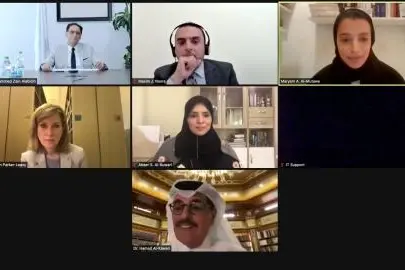PHOTO
Doha – Qatar National Library, in collaboration with the Ministry of Culture and Sports and the Islamic World Organization for Education, Science and Culture (ISESCO), recently held the session “The Role of Libraries in Preserving Islamic Cultural Heritage.” Inaugurated by His Excellency Dr. Hamad Bin Abdulaziz Al-Kawari, Minister of State, Qatar and President of Qatar National Library, the webinar was organized as part of the Doha Capital of Culture in the Islamic World 2021 celebrations.
The session’s speakers included His Excellency Dr. Muhammad Zain Al-Abidin, Director of Culture and Communication Sector at ICESCO, Abeer Saad Al-Kuwari, Director of Research and Learning Services at the Library, Maxim Nasra, Book Conservation Specialist at the Library, Susan Levy, Director of the Library of the Museum of Islamic Art, and Mahmoud Zaki, Manuscripts Specialist at the Library. The virtual event was moderated by Maryam Al-Mutawa, Head of Collections Access Section at the Heritage Library.
His Excellency Dr. Hamad Bin Abdulaziz Al-Kawari, Minister of State, Qatar and President of Qatar National Library, said, “In its role as the guardian of cultural regional heritage, the Qatar National Library has been actively participating in the celebrations of the Doha Capital of Culture in the Islamic World 2021 in Doha, owing to its portfolio of rare manuscripts and maps that provide members with extensive heritage knowledge. The Library has surpassed its traditional role of preserving heritage, to adopt advanced technologies and digital solutions to preserve Islamic heritage for future generations. We have embraced digitization to maintain the connection to our roots and ancestors, making our digitized materials an essential source of knowledge known to Muslims for ages.
Since the Library believes that the preservation of the Arab and Islamic heritage is the most important pillar of its mission, it has worked hard to build bridges of communication with international libraries, archives and cultural institutions. We have obtained digital copies of documents, manuscripts and materials that represent the golden age of the Islamic civilization. These items have also been published in the Qatar Digital Library portal, as a result of a long-standing relationship between the Library, Qatar Foundation and the British Library.”
His Excellency Dr. Muhammad Zain Al-Abidin, Director of the Culture and Communication Sector, Islamic World Organization for Education, Science and Culture (ISESCO) further added, “Over the past few centuries, public and private libraries have played a critical role in preserving and sharing Islamic heritage items of all kinds, despite the challenges of natural disasters and wars. As a result, our communities are more knowledgeable today and closely connected to their roots and culture. In our role as a global Islamic organization, we will continue to support libraries in preserving and sharing cultural heritage in the coming years.”
Libraries are one of the most prominent features of educational prosperity among Arabs and Muslims. Personal and public libraries have spread throughout the Islamic world. Islamic history has seen eras in which scholarship and authorship thrived in all arts and fields, and large libraries were visited by travelers from all over the world due to their fame and collections of rare books. The symposium helped shed light on the importance of preserving Islamic cultural heritage and discussed the current role of libraries in preserving Islamic cultural heritage.
The Heritage Library at Qatar National Library houses some of the region’s most rare and valuable books, manuscripts, maps and texts, including a permanent exhibition open for visitors to explore. To access the Heritage Library collection remotely, please visit https://www.qnl.qa/en/explore/heritage-library. Furthermore, the Library will be hosting similar discussions to continue raising heritage consciousness among libraries. For a complete list of events, please visit the Events page on the Library’s website ( www.qnl.qa/en/events ).
-Ends-
About Qatar National Library
Qatar National Library acts as a steward of Qatar’s national heritage by collecting, preserving, and making available the country’s recorded history. The Library provides equal access to all types of information and services and aims to enable the people of Qatar to positively influence society by creating an exceptional learning and discovery environment.
His Highness Sheikh Tamim bin Hamad Al Thani, the Amir of Qatar, officially inaugurated Qatar National Library on 16 April 2018. The Library was granted the status of national library under the Amiri Decree No.11 of 20 March 2018.
Qatar National Library’s Media Contacts:
Anna Bhalla
Email: QNLpressoffice@qnl.qa
© Press Release 2021
Disclaimer: The contents of this press release was provided from an external third party provider. This website is not responsible for, and does not control, such external content. This content is provided on an “as is” and “as available” basis and has not been edited in any way. Neither this website nor our affiliates guarantee the accuracy of or endorse the views or opinions expressed in this press release.
The press release is provided for informational purposes only. The content does not provide tax, legal or investment advice or opinion regarding the suitability, value or profitability of any particular security, portfolio or investment strategy. Neither this website nor our affiliates shall be liable for any errors or inaccuracies in the content, or for any actions taken by you in reliance thereon. You expressly agree that your use of the information within this article is at your sole risk.
To the fullest extent permitted by applicable law, this website, its parent company, its subsidiaries, its affiliates and the respective shareholders, directors, officers, employees, agents, advertisers, content providers and licensors will not be liable (jointly or severally) to you for any direct, indirect, consequential, special, incidental, punitive or exemplary damages, including without limitation, lost profits, lost savings and lost revenues, whether in negligence, tort, contract or any other theory of liability, even if the parties have been advised of the possibility or could have foreseen any such damages.




















